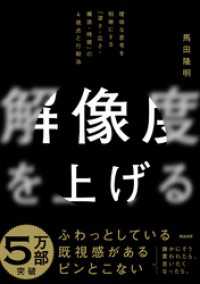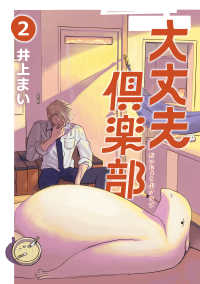- ホーム
- > 洋書
- > ドイツ書
- > Humanities, Arts & Music
- > Linguistics
- > english linguistics
Full Description
In the wake of decolonization, colonialist narratives have systematically been rewritten from indigenous perspectives. This phenomenon is referred to as "the Empire writes back to the centre"—a trend that asserted itself in late twentieth-century postcolonial criticism. The aim of such acts of writing back is to read colonialist texts in a Barthesian way inside-out or à l'envers, to deconstruct the Orientalist and colonialist dogmas, and eventually create a dialogue where there was only a monologue. Turning the colonial text inside-out and rereading it through the lens of a later code allows the postcolonial text to unlock the closures of its colonial precursor and change it from the inside. Under this critical scholarship, Joseph Conrad's Heart of Darkness (1899) has been a particularly influential text for Chinua Achebe and V. S. Naipaul. Their novels Things Fall Apart (1958) and A Bend in the River (1979) can be seen as a rewriting of Conrad's novella. However, before examining their different rewriting strategies, it would be fruitful to locate them within the postcolonial tradition of rewriting. While Achebe clearly stands as the leading figure of the movement, the Trinidadian novelist is, in fact, difficult to pigeonhole. Does Naipaul write back to, that is criticize, or does he rewrite, and in a way adopt and justify, imperial ideology? Since not all rewriting involves writing back in terms of anti-colonial critique, Naipaul's position continues to be explored as the enigmatic in-betweenness and double-edgedness of an "insider" turned "outsider." Taking cognizance of these different critical perceptions can become a way to effectively highlight Achebe's "(mis)-reading" and Naipaul's "(mis)-appropriation" of Conrad, a way to set the framework for the simulated conversation this book seeks to create between the three novelists.
Contents
Acknowledgements - Introduction - A Centre and Its Margins: The Dilemma of a Manichean Dichotomy - 'The Empire Writes Back to the Centre': A Movement of Territorial, Moral, and Aesthetic Decolonization - A Dialogue Where There Was Only a Monologue: Chinua Achebe Fights Back the Canon - An African Condition in a European Tradition: Chinua Achebe and the English Language of Native Narratives - Things Fall Apart: Chinua Achebe's Heart of Whiteness - V. S. Naipaul: The (Hi)Story of a Pro-Western Very Eastern Story-Teller - The Mimic Men: 'Almost the Same but not Quite' - A Bend in the River: A Heart-of-Darkness Rewrite - Conclusion - Index.







